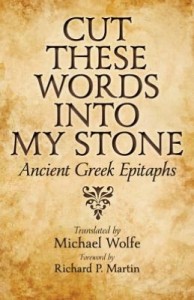Poetry Review: Lapidary Ends — “Cut These Words Into My Stone”
This anthology, made up of Michael Wolfe’s superb translations of ancient Greek epitaphs, begins in prehistory and ends in the sixth century C.E.
Cut These Words Into My Stone: Ancient Greek Epitaphs. Translated from the Classical Greek by Michael Wolfe. Johns Hopkins University Press, 208 pages, $24.95.
By Jim Kates
Nowadays, in poetry, death gets short shrift. Dying may be in, but not death. (There are some eloquent exceptions—I think most readily of W. S. Merwin’s Lament for the Makers and Jon Silkin’s “Death of a Son.”) It was not always so. The dead make up an immense corpus of traditional European literature, and elegy and epitaph stretch back from the beginning of what we call culture into our own day. So it seems to be almost with news from another planet, not just from another time and place, that Michael Wolfe brings us Cut These Words Into My Stone, his translations of classic epitaphs from the Greek Anthology, a collection that begins in prehistory and ends in the sixth century C.E.
In a clear and informative foreword, Richard P. Martin defines an epitaph in its role both as a grave-marker and as a literary form. He finds an affinity between epic and epitaph, “a shared artistic concern: to craft the most memorable evocation of special persons, whether heroes or kin, and to keep their memory alive for ages.” This very book stands as a measure of the success of that craft. We learn about people whose lives would otherwise have been ordinary,
This shed where Kleito lived is cramped,
His seed patch just a tiny strip,
His vineyard scant, his woodland scrubby.
Yet Kleito lasted eighty years here.
those whose lives hardly got started:
Here Phillip, father, laid down his highest hope:
A twelve-year-old son, Nicoteles.
and those who accomplished much:
Remember Alcman, master lyrist,
Ranked first by all nine Muses?
Here he lies,
A poet of contention between two continents —
Claimed by Greece as Sparta, by Asia as Lydian.
Lyric poets may have many mothers.
Cut These Words Into My Stone is bilingual. My own Classical Greek isn’t nearly good enough to assess the accuracy of the translations; the best I can do is triangulate with other versions of the same epitaphs. One of the most famous of these was the distich composed by Simonides over the Spartans who fell defending Thermopylæ against a Persian advance:
Ὦ ξεῖν’, ἀγγέλλειν Λακεδαιμονίοις ὅτι τῇδε
κείμεθα, τοῖς κείνων ῥήμασι πειθόμενοι.
You can read 13 earlier English versions, stretching back to the sixteenth century. And here is Wolfe’s.
Stranger, take the news back to the Spartans
That we lie here, who followed their commands.
The contemporary American does not attempt to turn the Greek metrics (well explicated in Martin’s introduction) into strict English rhyme, although the light echo between the last syllables hints at that tradition. He looks to simplicity of diction and a rhythmic variation between the lines to carry the burden. I find it stately and convincing.
Wolfe is not afraid of formal English effects, though, including end-rhyme, both strict,
Courageous Timocritus, this is his grave.
War spares the coward, not the brave.
and looser,
Here lies a woman famed throughout the land:
I only took my clothes off for one man.
or the deeper indigenous effects of alliteration and assonance,
See how even the flame of their pyre
Breaks into a pair of bickering tongues.
Or more extravagant divergence of form, with reason. Four lines by Hegesippus expand to 14 lines in Wolfe’s translation, but the lines are short, and the choice is more by breath and design than by expansion: “They say that Hermes / Leads good men / From the funeral pyre / To the Underworld . . . “ etc.
But more often, Wolfe stays close to the form of the original. One other comparison might give the flavor of his accomplishment. First, here, a translation of a Greek quatrain by the fourth-century (B.C.E.) Philetas of Samos, translated by F. L. Lucas into mannered English a half century ago:
Says this gravestone sorrow-laden: ‘Death has taken to his keeping,
In the first flower of her springtime, little Théodote.’
But the little one makes answer to her father: ‘Cease from weeping,
Theódotus. Unhappy all men must often be.’
And by Michael Wolfe these days:
This stone weighed down by grief describes
How Death has dragged off little Theodotia.
One line below, the short-lived daughter speaks:
Father, don’t weep. Humans are prone to misfortune.
Cut These Words Into My Stone is organized chronologically, from the first “anonymous epitaphs of no known date” through “Late Antiquity,” defined as from 200 to 599 C. E. During these last years, the last official institutions of Classical pagan culture shut down, and with them a particular set of attitudes toward death that centered on its finality. In addition to everything else, are we to hear echoes of theology in the riddling epitaph of Agathius Scholasticus?
This tomb holds no body.
This corpse has no grave.
It is its own corpse.
It is its own gravestone.
Not until the eighteenth century will European epitaphs again become so—well—lapidary. These translations refresh one of the oldest of European literary traditions.
Disclosure: Michael and I were college classmates 50 years ago, and I admired his poetry even then; so I bring certain prejudices to my reading. Caveat lector.


Hope’s wife: Bob, what do you want on your gravestone?
Hope: Surprise me.